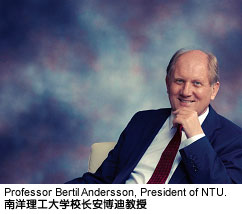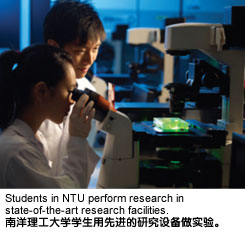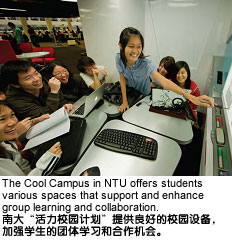 The Nanyang Technological University (NTU) wants to produce a different type of graduate to meet the challenges of the 21st century. Its President, Professor Bertil Andersson, tells us how this is translating into new courses and learning methods, as well as major infrastructural upgrades for the school.
The Nanyang Technological University (NTU) wants to produce a different type of graduate to meet the challenges of the 21st century. Its President, Professor Bertil Andersson, tells us how this is translating into new courses and learning methods, as well as major infrastructural upgrades for the school.
These are some of the things that the Nanyang Technological University (NTU) undergraduate of the future can look forward to: graduate from a brand-new medical school established in collaboration with the world-renowned Imperial College London; leverage online learning platforms and high-tech classrooms that foster group discussion and interaction; attend courses that go beyond their core disciplines; and stay in new hostels with trendy spaces for students of different backgrounds to meet, exchange ideas and get to know each other better.
The whole idea is to nurture graduates who will have an even sharper competitive edge once they enter the workforce.
The ideal NTU graduate will be: an upright person and a smart leader who also possesses a strong social conscience, expert knowledge and skills, and an enquiring and creative mind. It is NTU's hope that the new undergraduate experience that it is moulding will give its students a distinct competitive advantage in the new global talent marketplace.
A New Paradigm for Undergraduate Learning
 The most apparent and immediate change is to the undergraduate curriculum. This is being done to allow students to take courses outside of their core disciplines. The most apparent and immediate change is to the undergraduate curriculum. This is being done to allow students to take courses outside of their core disciplines.
Following the recommendations made in 2011 by its own review commission, NTU cut the total course content of its degree programmes by up to 14 per cent. It also introduced a number of new minors in areas ranging from environmental to sports sciences; implemented a new set of broad-based prescribed electives; and made its course in Environment Sustainability a compulsory cornerstone of the first-year curriculum. The increasingly interdisciplinary nature of the NTU experience is designed to produce T-shaped individuals who have a depth of specialised knowledge in one discipline and good, working knowledge in a number of other areas. Professor Bertil Andersson, President of NTU, hopes that the reduction in the overall course requirements will free up time for group-based learning and self-reflection.
"Reflect - that is a good word. Students should take time to understand what and how they are learning, and to review, plan and take responsibility for their own learning. Students should also be engaged in student activities, leadership activities, entrepreneurship, and running their own coffee shops and so on. In today's world, more employers are looking for broader skills. It is not just the major discipline - the softer skills are becoming more important. If you are an employer and you have five top-scoring candidates, you would select the applicant with the better soft skills. And if one candidate has been a student leader, then that's the most attractive one, because he has already proven that he can lead.
"Of course, there are students who are not so used to this kind of thinking. They say, 'Oh, if I don't amass and learn more knowledge, I will be less competitive.' But you see, more is not always better. When it comes to learning, you have quantity and quality. I cannot only push the quantitative.
 "Also, scientific knowledge and information is doubling every five years. I came here in 2007, that's five years ago, and in that short time the world has generated as much information as it did in the whole of the period from the birth of Christ up until 2007. That is fantastic, but it is also a scary thought. This also shows why we cannot continue to deliver all our information via lectures, because then a university education would probably take ten years. The fact is that one has to prioritise knowledge in the modern world because we have an absolute tsunami of information these days - and this makes the job of a university president very difficult. "Also, scientific knowledge and information is doubling every five years. I came here in 2007, that's five years ago, and in that short time the world has generated as much information as it did in the whole of the period from the birth of Christ up until 2007. That is fantastic, but it is also a scary thought. This also shows why we cannot continue to deliver all our information via lectures, because then a university education would probably take ten years. The fact is that one has to prioritise knowledge in the modern world because we have an absolute tsunami of information these days - and this makes the job of a university president very difficult.
"One has to realise there is a lot of false information and obscure information online. Therefore, you have to teach students how to evaluate information, because not all of what you see on the Internet is true, so you have to foster a critical mind, or you could say, a quality-assurance mind."
For Professor Andersson, the curriculum also has to encourage entrepreneurship. "When I was President of a Swedish university, we had 300 start-ups around the campus. 150 of these were started by students. Here, I don't see that. It's not that Singaporean students aren't smart. They are super smart. But they don't see their role as creating things. A few have, but much less than the Swedes.
"That is another reason why we have revamped the undergraduate curriculum. As a university we should give them the freedom to be entrepreneurs and start companies without being punished."
>> More
To read full content, please subscribe
|